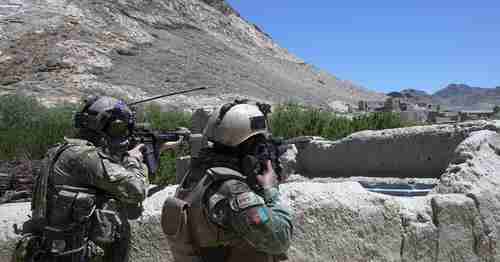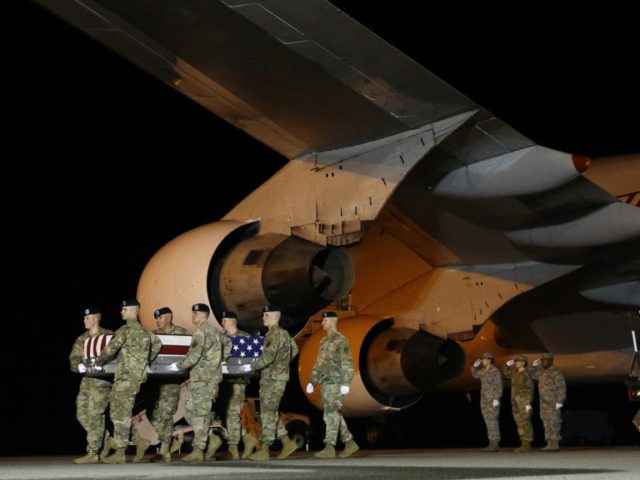This morning’s key headlines from GenerationalDynamics.com
- New head of U.S. Central Command says Afghanistan war is unsustainable
- Political opposition to Afghan strategy grows
- DJIA plunges 800 points on Tuesday
New head of U.S. Central Command says Afghanistan war is unsustainable

An Afghan command and a U.S. Special Forces soldier scan the horizon for enemy movement in Afghanistan, on May 24, 2018. (Military Times)
According to Lt. Gen. Kenneth McKenzie, the incoming head of the U.S. Central Command, the death rate among Afghan government security forces is unsustainable. He said he does not know how long it will take to develop an Afghan force capable of defending its own country.
Speaking at a meeting of the Senate Armed Services Committee Tuesday, McKenzie said that the war is currently stalemated:
They’re not there yet. If we left precipitously right now, they would not be able to successfully defend their country.
Their losses have been very high. They are fighting hard, but their losses are not going to be sustainable unless we correct this problem.
However, he did not spell out what changes are necessary to correct this problem. Also, he said he does not know know how long it will take to develop an Afghan force capable of defending its own country.
Long-time readers will not be surprised by this at all. In 2009, when President Barack Obama announced a “surge” of troops into Afghanistan, mimicking President George Bush’s successful troop surge into Iraq, I wrote that the Afghanistan troop surge would not be as successful as the Iraq troop surge. The Iraq troop surge was to eject foreign jihadists from Iraq, and it was successful because the Iraq Sunnis also wanted to eject foreign jihadists from Iraq. (“Iraqi Sunnis are turning against al-Qaeda in Iraq (01-Apr-2007)”)
But the Taliban are not foreign fighters. Afghanistan’s last generational crisis war was the extremely bloody Afghan crisis civil war, 1991-96, which mostly pitted the ethnic Pashtuns, who are Sunni Muslims and later formed the Taliban, versus the Northern Alliance of Tajiks, Hazaras, and Uzbeks in northern Afghanistan. Now, twenty years later, Afghanistan is in a generational Awakening era and a new young generation of Pashtuns is coming of age, raised on stories their parents told them about the atrocities committed by the Northern Alliance, and they are looking for revenge.
But you do not have to know anything about generational history to understand what is going on. You just have to understand that there was an extremely bloody, violent civil war in 1991-96, pitting the Pashtuns versus the Northern Alliance of Tajiks, Hazaras, and Uzbeks in northern Afghanistan. And you have to know that the Taliban are Pashtuns, and that young Pashtuns are looking for revenge for atrocities committed in the 1990s.
That is why the government cannot possibly control the Taliban and why trying “peace talks” with the Taliban does not even make sense. Even if the Taliban leaders agreed to some settlement, it would not satisfy their sons and daughters, who are not going to be deterred in their search for revenge. That is the way the world works.
The Taliban have repeatedly and consistently said that they will not agree to any peace deal until after the Nato troops have withdrawn.
There are some 16,000 American and NATO troops in Afghanistan, acting in a support role to the Afghan army. McKenzie said the U.S. and its allies need to keep helping the Afghans recruit and train forces to fight the Taliban’s estimated 60,000 troops. The 60,000 figure is considerably higher than previous estimates, which were around 20,000. Military Times and AP
Political opposition to Afghan strategy grows
At the Senate hearing, an angry Sen. Gary Peters, D-Mich, said: “We’ve been at it 17 years, 17 years is a long time. What are we doing differently when it comes to the Afghan security forces that we haven’t done for 17 years while being focused on this?”
McKenzie said that it is different this time because we have a key, new strategy in Afghanistan: peace talks with the Taliban. I guess he has forgotten numerous attempts at peace talks in the past, all of which have failed for the reasons that I just gave. McKenzie said:
I don’t know how long it will take. I do know that we’re working it very hard. I do know that they are making improvements. I do know that today it would be very difficult for them to survive without our and our coalition partners’ assistance. And we should remember that NATO and other nations are with us on the ground in Afghanistan.
That last point is true. NATO Secretary-General Jens Stoltenberg says that the NATO countries have reaffirmed their commitment to Afghanistan’s “long-term security and stability” despite mounting Afghan casualties.
Sometimes there is an uptick, an increase in violence because different parties try to gain the best possible position at the negotiating table. So it may actually become worse before it becomes better.
What this obscure statement apparently means is that the “uptick” in violence is a GOOD thing because it means that the Taliban want to gain an advantage before they negotiate peace.
As I have written in the past, there may be a dynamic going on. President Donald Trump’s foreign policy is totally baffling to the mainstream media and most politicians, but as I keep pointing out, everything makes perfect sense once you understand that he believes (correctly) that the U.S. is headed for a world war against China and Pakistan. So there is undoubtedly a larger purpose in not withdrawing from Afghanistan. As war with China and Pakistan approaches, President Trump wants to keep American troops active in Afghanistan and to continue to maintain several American military bases in Afghanistan, including two air bases in Bagram and Kandahar International Airport. These bases will be valuable in any future war with China. Under these circumstances, having troops in Afghanistan is what matters, whether the Taliban are defeated or not. Stars and Stripes and RFE/RL and Foreign Policy
Related Articles:
- Iraqi Sunnis are turning against al-Qaeda in Iraq (01-Apr-2007)
- Afghanistan’s president Ghani announces ceasefire with Taliban (20-Aug-2018)
- Obama’s Nobel Prize speech defends a ‘just war’ in Afghanistan (12-Dec-2009)
- Afghan Taliban launches multiple terror attacks, then declares farcical ceasefire (10-Jun-2018)
- Brief recent generational history of Afghanistan (25-Jul-2017)
DJIA plunges 800 points on Tuesday

Tweet from someone who lost everything in the 800 point plunge on Tuesday (ZeroHedge)
The Dow Jones Industrial Average (DJIA) plunged 800 points on Tuesday. The S&P and Nasdaq indexes fell by equivalent amounts. Undoubtedly, many people are like the person whose tweet is shown above who lost his own life savings, but also the life savings of his parents in a single day.
As I am writing this on Wednesday evening, the Dow Futures Index are down -250 points. Although it may recover in time for the market opening on Thursday morning, this once again reminds us that a full-scale stock market crash is not just possible – it is absolutely certain. It may happen this week, next month, next year, or thereafter, but it is going to happen.
The S&P 500 price/earnings ratio is around 20, down from 25 a year ago. The historical average for the P/E ratio is 14, meaning that the stock market is in a huge bubble, and this huge bubble will have to pop. The P/E ratio fell to the range of 5-6 three times in the last century, in 1919, 1949 and 1982, and it’s overdue to do so again. When that happens, the DJIA will fall to around the 3000 range.
And let’s not forget Bitcoin, which was the darling, trendy, highly stylish investment of about a year ago. Bitcoin is an asset with nothing backing it but hot air, and it could well become totally worthless in the next few months.
In the time it has taken me to write that last two paragraphs, the Dow Futures index has fallen further to -360. That is not to say that it will not pop up again, and may even go positive by morning. But what happened on Tuesday is very real, and it could happen to you or to anyone. ZeroHedge
Related Articles
- Bitcoin bubble and China’s Belt and Road bubble both appear to be crashing (28-Nov-2018)
- Wells Fargo receives laughable ‘punishment’ for massive criminal fraud (29-Sep-2016)
- ‘The Big Short’ – an infuriating movie about the financial crisis (26-Dec-2015)
- Reader comments on ‘The Big Short’ and the financial crisis (27-Dec-2015)
KEYS: Generational Dynamics, Afghanistan, Taliban, Kenneth McKenzie, Gary Peters, NATO, Jens Stoltenberg, China, Pakistan, Bagram, Kandahar International Airport, Dow Jones Industrial Average, DJIA
Permanent web link to this article
Receive daily World View columns by e-mail

COMMENTS
Please let us know if you're having issues with commenting.